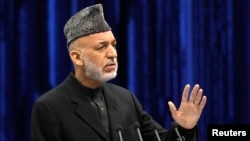KABUL —
Afghan President Hamid Karzai accused his U.S. ally on Sunday of withholding military supplies to press him to sign a bilateral security deal that will shape the U.S. military presence after most foreign troops leave in 2014.
Washington, which swiftly denied the assertion, has said that unless the pact is signed promptly, it could pull out most of its troops, as it did in Iraq two years ago.
“The cutting of fuel supplies and support services to the Afghan army and police is being used as a means of pressure to ensure Afghanistan ... signs the Bilateral Security Agreement,” a statement from Karzai's palace said.
Karzai said last week he might refuse to sign the deal until after Afghanistan's presidential election in April 2014.
U.S. officials said logistical problems in Pakistan might have given rise to the alleged delays in deliveries.
“There has been no stoppage in the delivery of requested fuel and we continue to process all orders as soon as they are received,” the NATO-led force in Afghanistan said in a statement.
Karzai's relationship with the United States has worsened since he invited thousands of elders to vote on the security deal last week and then ignored their advice, which was to sign it promptly.
Even after the pact's terms were settled after about a year of wrangling, Karzai has since added conditions that include the release of all Afghan prisoners from Guantanamo Bay in Cuba and an end to military operations involving Afghan homes.
On Thursday Karzai denounced his Western allies for bombing an Afghan home and killing a child, an accusation the NATO-led force has promised to investigate.
If the bilateral pact is not signed, Western aid running to billions of dollars will be in jeopardy and confidence in the fragile economy could collapse amid fears that Afghanistan will slip back into ethnic fighting or civil war.
Diplomats said Karzai may have overplayed his hand, raising the risk of a complete U.S. withdrawal from a country where Western troops have fought Taliban militants for the past 12 years. Karzai's domestic critics say he is playing a dangerous game with Afghanistan's future security.
The decade-long security deal would mandate the size and shape of the U.S. military presence in Afghanistan once the NATO combat mission ends next year. Without it, the United States would be unable to keep troops in Afghanistan, and most other nations would be likely to withdraw theirs too.
Afghanistan faces a potent Taliban insurgency and is still training its own military.
Washington, which swiftly denied the assertion, has said that unless the pact is signed promptly, it could pull out most of its troops, as it did in Iraq two years ago.
“The cutting of fuel supplies and support services to the Afghan army and police is being used as a means of pressure to ensure Afghanistan ... signs the Bilateral Security Agreement,” a statement from Karzai's palace said.
Karzai said last week he might refuse to sign the deal until after Afghanistan's presidential election in April 2014.
U.S. officials said logistical problems in Pakistan might have given rise to the alleged delays in deliveries.
“There has been no stoppage in the delivery of requested fuel and we continue to process all orders as soon as they are received,” the NATO-led force in Afghanistan said in a statement.
Karzai's relationship with the United States has worsened since he invited thousands of elders to vote on the security deal last week and then ignored their advice, which was to sign it promptly.
Even after the pact's terms were settled after about a year of wrangling, Karzai has since added conditions that include the release of all Afghan prisoners from Guantanamo Bay in Cuba and an end to military operations involving Afghan homes.
On Thursday Karzai denounced his Western allies for bombing an Afghan home and killing a child, an accusation the NATO-led force has promised to investigate.
If the bilateral pact is not signed, Western aid running to billions of dollars will be in jeopardy and confidence in the fragile economy could collapse amid fears that Afghanistan will slip back into ethnic fighting or civil war.
Diplomats said Karzai may have overplayed his hand, raising the risk of a complete U.S. withdrawal from a country where Western troops have fought Taliban militants for the past 12 years. Karzai's domestic critics say he is playing a dangerous game with Afghanistan's future security.
The decade-long security deal would mandate the size and shape of the U.S. military presence in Afghanistan once the NATO combat mission ends next year. Without it, the United States would be unable to keep troops in Afghanistan, and most other nations would be likely to withdraw theirs too.
Afghanistan faces a potent Taliban insurgency and is still training its own military.





